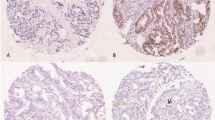Abstract
PURPOSE: Proliferating cell nuclear antigen immunohistochemical expression and flow cytometry techniques were used in this study to estimate the proliferation tendency and biologic aggressiveness in benign and malignant epithelial tumors of the colon and rectum. METHODS: Thirty-five adenomas and 60 adenocarcinomas were studied immunohistochemically concerning proliferating cell nuclear antigen positivity in tumor cell nuclei. In addition, flow cytometry techniques were used to estimate the DNA content and percentage of tumor cells in the S-phase. RESULTS: The mean proliferating cell nuclear antigen score for adenomas was 38 percent compared with a mean score of 50.4 percent for adenocarcinomas that were studied (P<0.05). In dysplastic areas of malignantly transformed adenomas (n=5), the highest proliferating cell nuclear antigen score (80 percent) was focally observed. Taking flow cytometry parameters into account, we found out that proliferating cell nuclear antigen can be used as an indirect indicator of the number of cells in the S-phase (SPF) but not as an independent prognostic factor. Statistical significance was found between Type III (aneuploid carcinomas) and increased proliferating cell nuclear antigen expression (proliferating cell nuclear antigen score ⩾ 60 percent). Furthermore, aneuploidy was especially found on cancer located on the left colon (44 percentvs.14 percent of right colon neoplasms). Considering DNA ploidy of the above neoplasms, the aneuploid adenocarcinomas had a tendency for poorer prognosis especially if they were related to Dukes Stage C female patients. CONCLUSIONS: The comparative assessment of the above parameters might be of considerable importance in the study of the proliferation activity of any form of colorectal neoplasia.
Similar content being viewed by others
References
Fairman MP. DNA polymerase-δ/PCNA: actions and interactions. J Cell Sci 1990;94:1–4.
Hedley DW, Friedlander ML, Taylor IW,et al. Method for analysis of cellular DNA content in paraffin-embedded pathological material using flow cytometry. J Histochem Cytochem 1983;31:1333–5.
Atkin NB, Kay R. Prognostic significance of model DNA value and other factors in malignant tissues based on 1965 cases. Br J Cancer 1979;40:210–21.
Atkin NB. Prognostic significance of ploidy level in human tumours. I: Carcinoma of the uterus. J Natl Cancer Inst 1976;56:90–9.
Abe S, Makimura S, Itabashi K, Nagai T, Boneta Y, Kawayami Y. Prognostic significance of nuclear DNA content in small cell carcinoma of the lung. Cancer 1985;56:2025–30.
Henry F, Frierson MD Jr. Ploidy analysis and S-phase fraction determination by flow cytometry of invasive adenocarcinomas of the breast. Am J Surg Pathol 1991;15:358–67.
Morson BC. The pathogenesis of colorectal cancer. Monography. Major problems in pathology. Vol. 10. Philadelphia: WB Saunders, 1978.
Fenoglio CM, Pascal RR. Colorectal adenomas and cancer: pathologic relationships. Cancer 1982;50:2601–8.
Rossini FP, Ferrari A, Spandre M, Cavallero M, Risio M, Coverlizza S. Diagnosis and management of adenomas with invasive carcinoma: an Italian expression. In: Fenoglio-Preiser CM, Rossini FP, eds. Adenomas and adenomas containing carcinoma of the large bowel: advances in diagnosis and therapy. New York: Raven Press, 1985:83–102.
Risio M, Coverlizza S, Ferrari A, Candelaresi GL, Rossini FD. Immunohistochemical study of epithelial cell proliferation in hyperplastic polyps, adenomas and adenocarcinomas of the large bowel. Gastroenterology 1988;94:899–906.
Yamada K, Yoshitake K, Sato M, Ahnen DJ. Proliferating cell nuclear antigen expression in normal, preneoplastic and neoplastic colonic epithelium of the rat. Gastroenterology 1992;103:160–7.
Quirke P, Fozard JB, Dixon MF, Dyson JED, Giles GR, Bird CC. DNA aneuploidy in colorectal adenomas. Br J Cancer 1986;53:477–81.
Matthews J, Sousha S, Parkins RA, Glynn M, Cooke T. Proliferation patterns and aneuploidy in adenomatous polyps of the colon. Br J Surg 1988;75:906–9.
Weiss H, Wildner GP, Jacobasch KH, Heinz U, Schaelicke W. Characterization of human adenomatous polyps of the colorectal bowel by means of DNA distribution patterns. Oncology 1985;42:33–41.
Rognum TO, Thorud E, Lund OE. Survival of large bowel carcinoma patients with different DNA ploidy. Br J Cancer 1987;56:633–6.
Rognum TO, Brandtzaeg P, Thorud E. Is heterogeneous expression of HLA-DR antigens and CEA along with DNA-profile variations evidence of phenotypic instability and clonal proliferation in human large bowel carcinomas? Br J Cancer 1983;48:543–51.
Wolley RC, Schreiber K, Koss LG, Karas M, Sherman A. DNA distribution in human colon carcinomas and its relationship to clinical behaviour. J Natl Cancer Inst 1982;69:15–22.
Finan PJ, Quirke P, Dixon MF, Dyson GR, Giles CR, Bird CC. Is DNA aneuploidy a good prognostic indicator in patients with advanced colorectal cancer? Br J Cancer 1986;54:327–30.
Kouri M, Pyrhoenen S, Mecklin JP,et al. The prognostic value of DNA ploidy in colorectal carcinoma: a prospective study. Br J Cancer 1990;62:976–81.
Armitage NC, Robins RA, Evans DF, Turner DR, Baldwing RW, Hardcastle JD. The influence of tumour cell DNA abnormalities on survival in colorectal cancer. Br J Surg 1975;72:828–30.
Johnston PG, O'Brien MJ, Dervan PA, Carney DN. Immunohistochemical analysis of cell kinetic parameters in colonic adenocarcinomas, adenomas and normal mucosa. Hum Pathol 1989;20:696–700.
Author information
Authors and Affiliations
About this article
Cite this article
Lazaris, A.C., Davaris, P., Nakopoulou, L. et al. Correlation between immunohistochemical expression of proliferating cell nuclear antigen and flow cytometry parameters in colorectal neoplasia. Dis Colon Rectum 37, 1083–1089 (1994). https://doi.org/10.1007/BF02049808
Issue Date:
DOI: https://doi.org/10.1007/BF02049808




